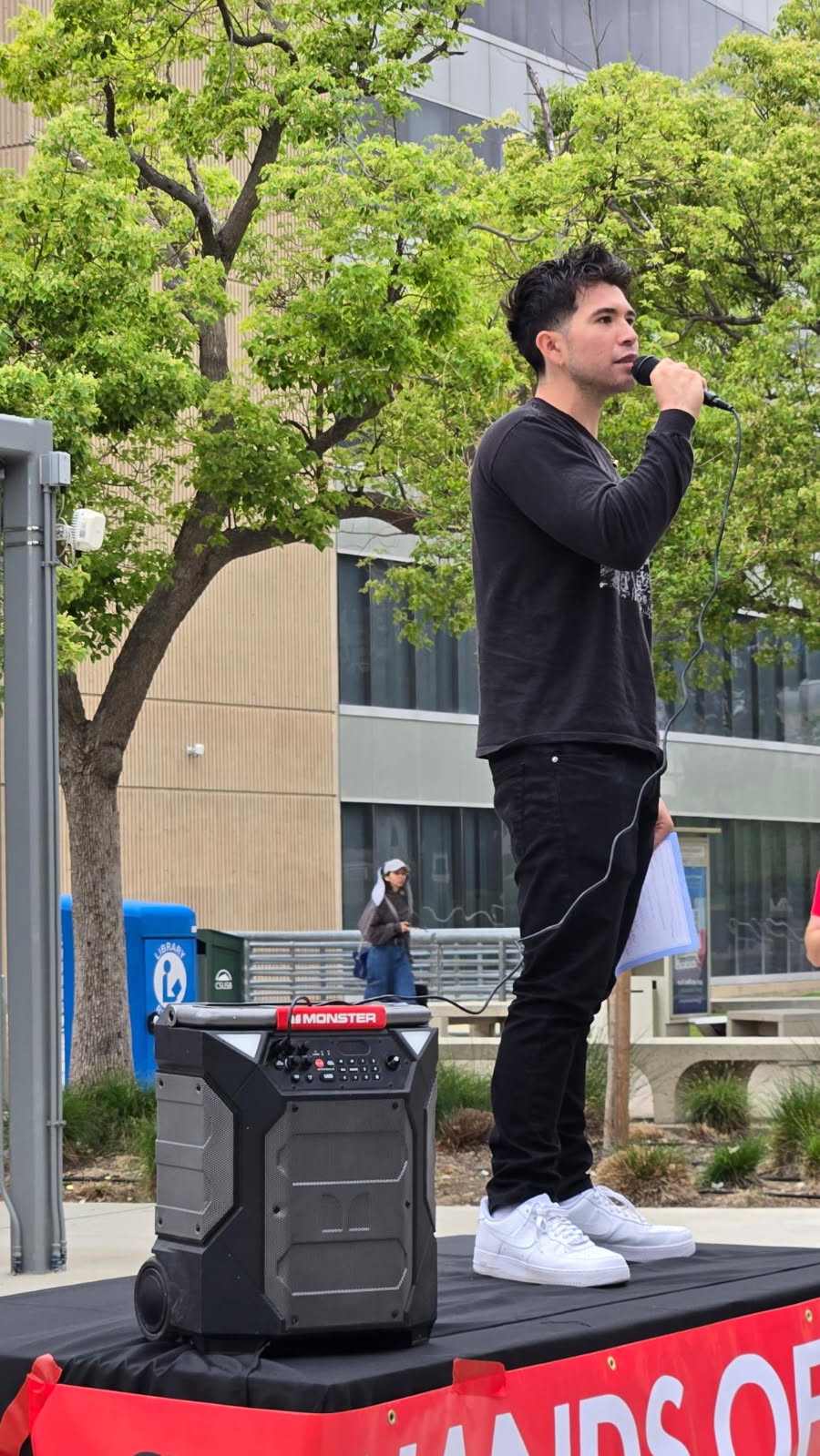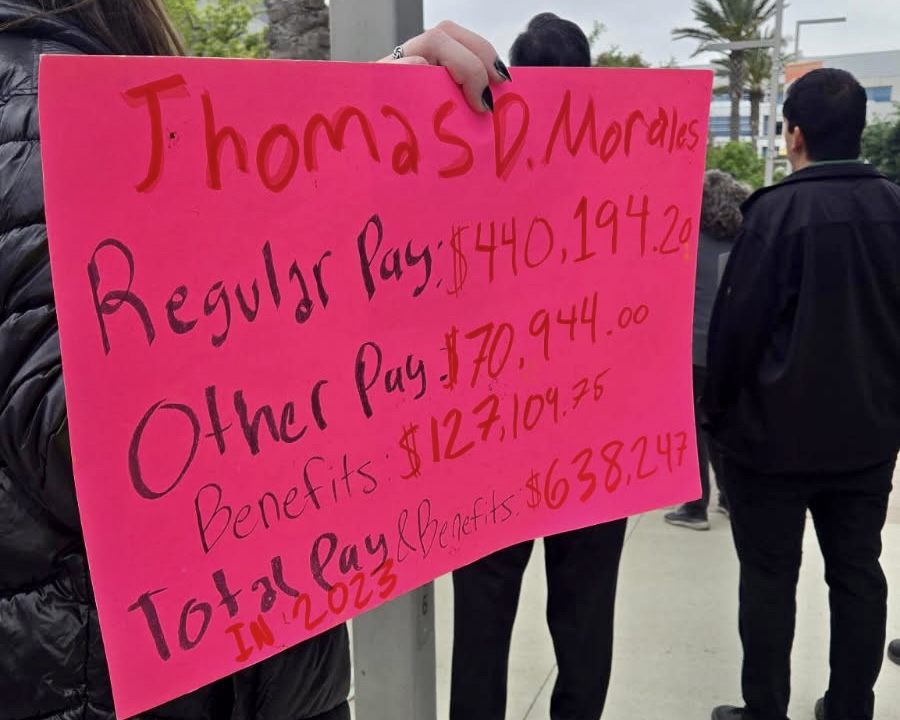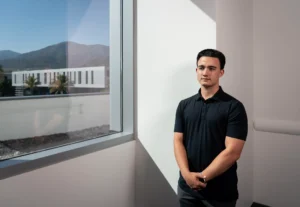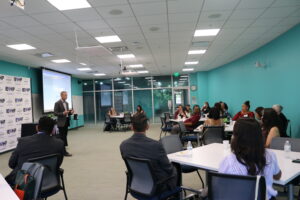In the CSU, the Threat to Higher Education is Coming from Inside the House: Op-Ed
4 min read
A CSUSB student speaking during the protest on April 17, 2025.
By Dr. Thomas F. Corrigan
On Thursday, April 17, Cal State San Bernardino faculty, staff, and students demonstrated against the austerity and authoritarianism gripping our university and U.S. higher education, generally.
The rally is part of a National Day of Action for Higher Education, and the stakes couldn’t be higher.
In recent weeks, the Trump Administration has gutted the Department of Education and federal research programs while weaponizing investigations, federal funding, and visas in an attempt to cow universities, their faculty, and students.
At CSUSB, vital research grants have been cancelled, including the U-RISE program, which prepared students for Ph.D.s in biomedical fields. The Department of Education also launched a dubious investigation into CSUSB’s alleged involvement in “The PhD Project”—a program that helps Black and Latino students pursue business degrees. CSUSB international students are among the hundreds nationwide who have had their visas revoked for things like minor traffic infractions. And undocumented students study and live amid the persistent threat of ICE raids.
This is more than reckless cost-cutting, xenophobia, and bigotry; it is also straight out of the fascist playbook. Because colleges and universities specialize in independent thought, they represent a challenge to authoritarian power. So, Trump seeks to bring us to heel.
Trump is not the only threat to higher education, though. In the CSU system, the Chancellor’s Office and campus administrations are engaged in their own austerity and authoritarianism.
The CSU claims that California’s tight budget requires campuses to take aggressive “budget mitigation” measures. At Sonoma State, 21 academic programs were eliminated, and at least 46 faculty won’t have contracts renewed. Eight other CSU campuses have received faculty layoff notices.

At CSUSB, it’s more a “death by a thousand cuts.” Widespread course cancellations have left many part-time lecturers (who are disproportionately women and people of color) without work and students without needed classes. Administrators pack the remaining courses with more students than are pedagogically appropriate. Campus offices operate with overworked, skeleton staffs. Faculty research time has evaporated, and some are being told not to print their exams!
Yet, at California Faculty Association’s San Bernardino chapter, we refer to this as a “so-called budget crisis.” Why? As California Faculty Association’s March 2025 report, “Short-changing
students” shows, the CSU has reduced investment in instruction while increasing spending on management, campus police, investment portfolios, and new facilities.
The figures are staggering. Chancellor García’s compensation approaches $1 million annually, and her office’s budget is up 116% over the past decade. Campus presidents recently received raises of up to 29%, and CSUSB President Tomás Morales’s compensation was $638,000 in 2023—more than twice the Governor’s. Meanwhile, CSUSB’s management personnel headcount is up 50% since 2010 even though enrollment has remained flat. At the end of the last academic year, the CSU sat on an incredible $11.6 billion in reserves, investments, and cash. And this year, the CSU entered into a controversial $17 million deal to integrate OpenAI’s ChatGPT Edu service throughout the curriculum, and they did so without any faculty consultation. Some “budget crisis,” huh?
The CSU has an authoritarian streak, too. In response to last year’s campus protests against the genocide in Gaza, the CSU has used an interim “Time, Place, and Manner” policy to crack down on inconvenient campus expression.
Last Fall, five Long Beach State faculty received disciplinary warnings for using sound amplification at a protest. Other faculty had previously used sound amplification without issue, but these five had published an article calling for the CSU to divest from weapons suppliers for Israel. So, the warnings smacked of selective enforcement.
More recently, six CSU San Marcos students faced severe retaliation, including disciplinary hearings and employment termination, for demonstrating for sanctuary campus status. One wonders if they would have received the same response had they not been protesting an event featuring Chancellor García.
The potential ramifications of this overreach are profound. If the CSU brings disciplinary actions against our faculty or students for engaging in inconvenient expression on campus, the Trump Administration may well use those disciplinary actions as pretext for harassment, intimidation, or worse. So, it’s crucial both the Trump Administration and the CSU to keep their hands off faculty and students—particularly when we’re exercising our First Amendment rights.
The CSU was once called “The People’s University” for striving to provide affordable, quality education to all Californians. And CSUSB has been an engine of community empowerment and social mobility in the Inland Empire. But doing so requires adequate funding for instruction and student support, as well as strong protections for academic freedom and expression on campus.
We call on the Governor and Legislature to fully fund CSU instruction and student services; for the Board of Trustees to rescind its 34% tuition hike and slash administrative salaries and bloat; and for the CSU to dump its unconstitutional TPM policy.
In short, it’s time we liberate the CSU.
Dr. Thomas F. Corrigan is a Professor in the Department of Communication and Media at CSUSB and Vice President of California Faculty Association, San Bernardino.






